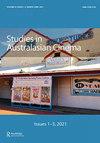Screen memories: film’s knowing and historical trauma in The Tracker
IF 0.7
0 FILM, RADIO, TELEVISION
引用次数: 0
Abstract
ABSTRACT This paper examines Rolf de Heer’s 2002 film, ‘The Tracker’, in the context of the ‘history war’ debates relating to frontier violence that were rehearsed in the Australian public sphere during the 1990s/2000s. I examine how ‘The Tracker’ challenges the very terms underpinning conventional forms of historiography, wedded to discourses of ‘fact’ and ‘truth’, in the way it investigates what it means to ‘screen’ memory within the context of the politics of the present. Focusing on ‘The Tracker's' self-conscious use of Peter Coad's arresting paintings of frontier violence, I argue that ‘The Tracker’ develops a nuanced engagement with frontier history in the way it highlights the dialectics of ‘revealing’ and ‘concealing’ – rupture and disavowal – at play in the nation’s ‘screening’ of frontier violence.银幕记忆:《追猎者》中电影的认知与历史创伤
摘要本文考察了罗尔夫·德·希尔2002年的电影《追踪者》,在20世纪90年代和21世纪初澳大利亚公共领域与边境暴力有关的“历史战争”辩论的背景下。我研究了《追踪者》是如何挑战支撑传统史学形式的术语的,它与“事实”和“真相”的话语结合在一起,以调查在当前政治背景下“筛选”记忆的意义的方式。关注《追踪者》对彼得·科德引人注目的边境暴力画作的自觉使用,我认为《追踪者》通过强调“揭示”和“隐藏”的辩证法——破裂和否认——在国家对边境暴力的“筛选”中发挥作用,发展了对边境历史的细致入微的参与。
本文章由计算机程序翻译,如有差异,请以英文原文为准。
求助全文
约1分钟内获得全文
求助全文

 求助内容:
求助内容: 应助结果提醒方式:
应助结果提醒方式:


